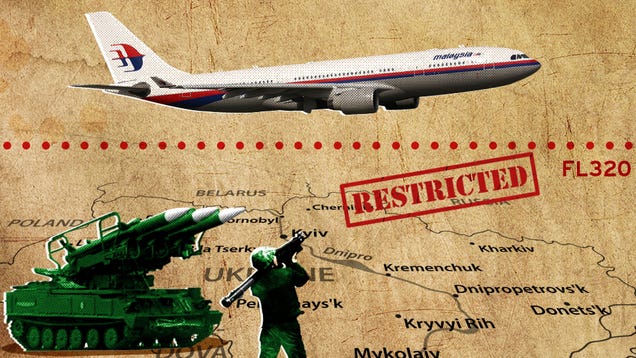 EXPAND
EXPAND
MH17 Was Barely Above Restricted Airspace When It Was Shot Dow
by Tyler Rogoway
Foxtrot Alpha
Many people are asking: What was an airliner doing flying over a war zone? This is a valid question considering that many aircraft have been shot down over Ukraine recently and it was known that pro-Russian forces had recently seized advanced SAMs. Technically, MH17 was flying where it was supposed to, which indicates a larger failure.
There was a notice to airman put out on July 17th stating that flights below FL320 (32,000 feet) were restricted over Eastern Ukraine. MH17 was flying at FL330 (33,000 feet) when the shoot-down occurred.
Was flying so close to a exclusion zone that had known anti-aircraft activity an unnecessary risk taken by the pilots or by their carrier? Possibly, but there are other carriers that have also operated over the same airspace regularly in the previous months, and yes, fuel savings is a major factor in route planning, as is weather.
The larger issue may be the failure of the intelligence system, U.S. or otherwise, to notify international aviation authorities in each country and/or region of the fact that longer-range SAMs were now under the control of pro-Russia separatists and their level training when it comes to operating them and their associated command and control apparatus was totally questionable.
In addition to rebels recently getting their hands on SA-11 ‘Buk’ road-mobile SAMs, Russia has amassed a massive anti-air arsenal along its border, and the MANPADS threat remains rampant in the area. Although flight above 25k feet is well outside of the MANPADS threat, it does become a major factor should a flight have to descend below that altitude in an emergency.
In all reality, so much anti-air warfare was going on over Eastern Ukraine that it should have been off limits, especially considering the FAA ordered flights to not overfly Crimea during the earlier stages of Russia’s invasion, of which there was no air war.
To add to the pile of evidence that would support a total restriction of commercial flights in the area, earlier in the week an AN-26 was shot down while flying outside the MANPADS envelope in the same area that MH17 was lost.
Then, just hours before MH17 dropped off radar, a Ukrainian SU-25 was lost with the Ukrainian Government saying it was shot down by a Russian fighter that had crossed over the border. Ukraine’s account of a fighter downing the SU-25 may have been inaccurate, as it would justify the fact that a non-MANPAD missile took the jet down. Either way, there was so much evidence that the anti-air threat posture had rapidly advanced over Eastern Ukraine, why didn’t the flight restriction change with it?
This puzzling disparity between the hostile realities in the region and its accessibility to commercial traffic is even more so considering that the U.S. is closely monitoring the electronic order of battle (radar and integrated air defense radio emissions) in the region. The U.S. has admitted that they detected the radar emissions of what was most likely a SA-11 “Buk” missile system originating from the western side of the Russian-Ukraine border. American surveillance assets also detected the actual hot infrared plume of the missile’s exhaust as it ascended toward its defenseless target, and its fiery aftermath.
The sources of collection for such data when it comes to monitoring for SAM systems coming online and fire control radars “painting” targets can be collected from aircraft such as the RC-135 Rivet Joint, U-2 Dragon Lady, RQ-4 Global Hawk, EP-3 Aeries and other classified stealth aircraft such as the RQ-170 Sentinel or its bigger and more clandestine brother known informally in the press as the RQ-180. Even ships operating off the coast can detect and classify these emissions. Satellites in low earth orbit may also provide some of this information in near real time as well.
As for the detection of the missile in flight, its impact and MH17’s crash into the ground, that was most certainly picked up by the Space Based Infra-Red System (SBIRS) and associated satellites. This technology was built as an early warning system aimed at detecting ballistic missile launches during the Cold War and has evolved ever since to become a key node inAmerica’s vast missile defense apparatus. One of its “off label” uses is rumored to be detection of SAM launches.
As for what happens next, geopolitically it is debatable. Ukraine and pro-Russian and Russian forces all blame one-another, yet it is widely assumed that Russian special forces and intelligence units are operating alongside rebel forces, if not as fighters than as “technical advisors” at the minimum. If Russia provided the expertise on how to successfully employ the SA-11 there will be major repercussions, but that is in no way certain. Ukraine has operated the “buk” and other SAM systems for decades and there is no reason not to believe that active or retired Ukrainian military personnel fighting for the rebels could not have put the commandeered and self-contained SAM system to use.
On the other hand, there are rumors that the SA-11 unit involved has been moved over the Border to Russia and that MH17s black boxes have been expressed to Moscow. This, along withthis flagrant radio intercept, of which we are still not 100% certain is authentic, surely points to deeper Russian involvement, especially considering the notoriety of one of the supposed people speaking on it.
Now, as the shock of losing another Malaysian Air Boeing 777 subsides, the focus will turn towards how this happened, who caused it, and how it could have been prevented. Sadly, like most human-made disasters, it was probably the result of not just one, but a series of systemic failures that cascaded together in a moment in time, resulting in horrible and totally pointless tragedy.
Illustration by Sam Wooley.